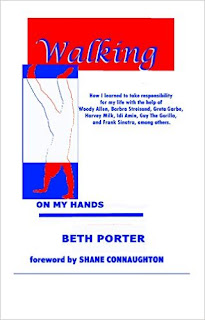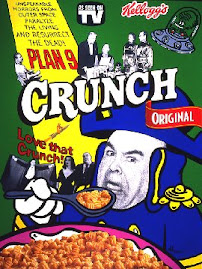Review and interview by Doug Gibson
Beth Porter has had a fascinating career, able to share the evolution of entertainment and cultural shifts covering more than 50 years. Whether on stage, film, television and behind the scenes, she's had a successful tenure in the industry. Her memoir, Walking On My Hands is an intensely personal, honest autobiographical account of her life, the personal and the professional. It kept me reading way past my sleeping hours.
For cult movies fans, Beth is also known as the star of Andy Milligan's now lost "The Naked Witch." In her memoir she describes the kindness of her relationship with the late director, who was a colleague of her's in those day, directing, acting, and auditioning. She also had a role in Woody Allen's Love and Death. That's how I first became acquainted with her work. She also was in the 1974 film version of The Great Gatsby.
Below is my Amazon review of Beth's memoir, as well as an interview with her. The New York native lives in London today.
---
A FASCINATING MEMOIR FROM A GIFTED STORYTELLER
I love this memoir. It's a ride through the cultural life of the past several decades. To take a short detour, I first became a fan of Beth Porter when, while watching "Love and Death" for the 100th time, I suddenly realized that "Anna" looked a heck of a lot like the star of a lost Andy Milligan film called "The Naked Witch." Sure enough, the same actress. A check of her IMDB page showed a long, distinguished career in the arts and I often thought of trying to reach her, and ask her about Milligan. I'm going on 10 years as one of those "no hopers" who are fans of Andy, and still doing very well.
Thanks to Facebook and a Milligan page, I learned that Beth Porter was working on a memoir and recently I was able to read it. It's a fascinating read. Besides her career, she opens up about her family, her love life, her politics, life in the film and stage world of 1960s New York City, and a successful career with the BBC, from acting to behind the camera. And she talks about traveling the world, a lot of Europe, in acting groups. She's a big part of the famous La MaMa Troupe. She recounts being on the West End. There are too many anecdotes to provide justice, but what can you say about an actress who a critic opined performed like Mae West thinking of a sex change? Or Beth hollering to Maggie Smith at a fat farm if it was her eyelashes that were fat? Or meeting Albert Finney and watching "Murder on the Orient Express" being filmed?
As for Milligan, Beth provides a softer, more endearing recollection of the gutter auteur. She recalls him as a serious, thoughtful actor and director who was using the soft-core era of the mid 60s to make more serious, almost low-budget Orson Welles types of films. She mentions that "Orphans of the Storm" serves as an inspiration for "The Naked Witch." What a pity this film is lost. For many of us, it's our "London After Midnight." Beth recalls doing Othello with Milligan, auditioning with him, and even stayed in his Staten Island home. She mentions the Caffe Cino era and Neal Flanagan and Johnny Dodd are among those in the pages.
I could go on, but read the book. It may take a while but it's never dull and the author's talents and enthusiasm for life and all the change ups it throws us are on every paragraph. Frankly, this memoir could easily fit into a syllabus on contemporary entertainment in the latter decades of the 20th century.
----
For $2.99 on Amazon Kindle, "Walking On My Hands" is a great bargain. What fascinated me so much about the books is the time capsule glimpses into certain eras of entertainment, places and culture. We can read about the world of independent film and acting troupes 50 years ago, but nothing is better than actually conversing and learning from someone who lived those times.
---
Here's my interview with Beth Porter:
La Mama: What impact has that had on women's drama and comedy 50 years later?
PORTER: This is very difficult for me to answer because my relationship with theatre has changed so drastically, not least because I've lived abroad for so many decades. From my perspective I think there are more opportunities for women in show biz genres of all disciplines. But still not nearly enough. I've spoken about this through-out the book, actually. Do you have recollections of Shirley Stoler, cult actress and Caffe Cino actor, as well as La Mama?
PORTER: I must have met her, but by the time she'd returned from Tom O'Horgan's La MaMa mini-tour abroad in 1966, I was becoming part of what would soon become The La MaMa Troupe. Of course I saw her in some of her films and thought her a powerful if unpolished actress. Did you ever meet Hope Stansbury, who wrote the Milligan-directed "Vapors," was a waitress at Caffe Cino, and starred in several Milligan films?
PORTER: Yes, though we were never friends. I thought her appearance was striking! There are a couple of funny stories about her which were being circulated at the time. The first involves another person, whose name I've forgotten, but who was a tall, thin man who always wore his hair very long. The line was: Who's that over there? The answer was: Well, it's either [the man's name] going, or Hope Stansbury coming!
The other story involves Hope riding the subway on a particularly stifling NYC summer day. She looks up to see a man standing in front of her wearing a long raincoat which he opens to reveal he's naked, his penis staring her in the face. She says to the man, "Oh, yes, it is terribly hot, isn't it?" And that, Doug, is how legends are born! And on The Naked Witch, what's it like performing in your first film, the feelings, emotions. How did Milligan help or hinder?
PORTER: As you've read in my book, it wasn't my first film, but it was the first film in which I had the starring role. I was excited -- in my naivety -- that it would be the basis of my ambitions. Andy was primarily concerned with the many behind-camera roles he took. As I've written, he was always kind to me. You had mentioned you are in The Filthy Five. Were you paid for it? Do you recall those films, seeing them in theaters?
PORTER: Well, I'm not even sure it was The Filthy Five, as I've written. I can't remember anything about getting paid, which doesn't mean I wasn't. Money has never been important to me. I never went to see any of Andy's films - except for The Naked Temptress in London, as I've written about in my book. Judging from my own work with Andy, I didn't think any of the actors was anything special - including me. And some of them were just plain bad! Besides Neal Flanagan, who were some Caffe Cino, troupe, Milligan actors that made an impact on you?
PORTER: My off-off-Broadway memories are dominated by its atmosphere rather than any specific actors. To be honest, compared with some of the acting both off-Broadway and on B'way at the time, off-off-B'way performers weren't that accompished. Two who were: Seth Allen, despite his emotional problems, was capable of extraordinary theatrical electricity. Warren Finnerty of The Living Theatre especially in The Brig has also stayed with me over all these years. Joe Papp's Public Shakespeare Theatre showcased scores of fine actors. Ruby Dee and Ossie Davis, and Robert Hooks [of The Negro Ensemble Company], were all committed to black performance, and proved how short-sighted it was of off-off-Broadway writers not to provide more roles for their talents.
Here are some recollections of Milligan from Beth's memoir:
"Andy and I became very close friends. ... I can only speak about my own relationship, which was always based on kindness." ...
"Andy was never a conventionally good-looking man, his Irish features just awry. It gave an unexpected sadness to the twinkle in his smile. His intellect transcended much of the pettiness rife among insecure and unsuccessful actors. I found his analyses of classic drama informed and cogent. ... He also had an extensive knowledge of films, and at some point in his life had learned how to hand-make clothing." ...
"After Othello, Andy and I stayed in touch and one day he asked me to help him audition with a scene from Desire Under the Elms. ... I was so flattered that Andy had thought of me, and the scene he's chosen was one of Eugene O'Neil's most heart-rending." ...
"Andy proved a perceptive director, and I truly learned a lot from working with him. ... When the audition results were announced they wanted me but not Andy. He must have been devastated, but congratulated me warmly and hoped we'd be able to work together again. ..."
(ME IN CAPS) THEY DID WORK TOGETHER AGAIN IN THE NAKED WITCH. AS PORTER SAYS IN HER MEMOIR, IT WAS "at the time called nudie films ... but were in only tangential ways related to the soft-porn of recent years, and in no way even close to the hard-core images freely available online today."
"... What Andy originally wanted to achieve was a low-rent version of the Orson Welles repertory company, crafting scripts far outside the usual prurient fare. ..."
MILLIGAN'S THE NAKED WITCH IS A VERY SMALL PART OF A MEMOIR THAT COVERS A LONG, INTERESTING LIFE IN THE ENTERTAINMENT WORLD. TO READ MORE, I RECOMMEND BUYING "WALKING ON MY HANDS,"
Thanks very much to Beth Porter for sharing her life with readers and providing Plan9Crunch the opportunity to review her book and interview her.



No comments:
Post a Comment